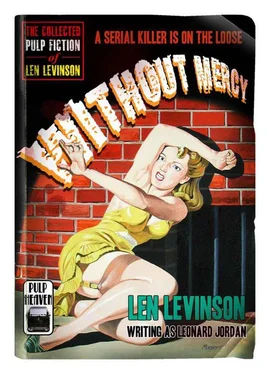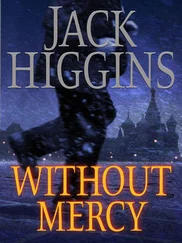“Well, what can I do for you?”
“I want to see what you have on a certain cabdriver.”
“What’s his name?”
“Kowalchuk. What’s your name?”
“Tiernan. How about you?”
“Danny Rackman.”
“Right this way, Detective Rackman.”
Rackman followed her to a file cabinet, and he realized that he liked this Ms. Tiernan. She was a cheerful, bright person and she didn’t look so bad either. Rackman thought that a guy who sat alone in his apartment looking at stroke magazines didn’t meet decent women like this, or maybe if he did, his mind was so poisoned by bitterness and resentment that he couldn’t see the decency in them.
“You look like you’re ready to fall asleep,” Ms. Tiernan said, pulling out a drawer in the file cabinet marked K.
“I’ve been up all night.”
“That’s not so good for your health.” She slammed the file drawer shut and pulled out the one beneath it. The door opened and a few more people came in.
Rackman looked at Ms. Tiernan’s nice round fanny and thought he should get her phone number, but he was too tired, his brain was fading out and he wasn’t up to it.
“Here we are,” Ms. Tiernan said, taking out a form and a picture. “Kowalchuk, Frank D.” She handed it to Rackman.
He looked at the picture, and a round unshaven face looked back at him. The hair was straight and unruly, the nose was pugged, and the mouth was big and sloppy.
“Mind if I sit down?’ Rackman asked.
“Go ahead. I’ll be in my office down the hall if you need me for anything.”
Rackman sat on a yellow fiberglass chair against the wall and studied Kowalchuk’s face, the pinched little eyes, the scowling expression, the cruelty of the mouth, or was it a grimace of pain? This was not the sort of man that women loved.
Rackman looked at Kowalchuk’s application for a hack license, noting his address at 329 East Ninth Street. He saw the fingerprints but couldn’t find where Kowalchuk was presently employed. Getting up, he walked down the hall to Ms. Tiernan’s office.
She was behind her desk, looking at some papers. “What’s the problem?” she asked in a manner that suggested she could solve any problem in the world.
Rackman pointed to the application form. “It doesn’t say where he’s working now.”
“We don’t have that information. These cabdrivers always are switching jobs, and it’s hard to keep up with them.”
“We’ll have to check the garages, then.”
“Yes, that’s the only way.”
Rackman held the form and photograph in the air. “Can I take these with me?”
“Yes, but you’ll have to sign for them.”
“Show me the dotted line,” he said.
Rackman left the Taxi Commission and drove uptown, wondering if Kowalchuk had come home yet. He stopped at a Kentucky Fried Chicken on Fourteenth Street and got some pieces, gnawing them behind the wheel as he continued to Midtown North. His brain was starting to zonk out and he knew he had to get to bed fast, before he had an automobile accident.
He parked in his slot halfway up the block from Midtown North and made his way to Jenkins’ office, but Jenkins still wasn’t in.
Detective First Grade Shannon was in the outer office reading the Daily News.
“Did they pick up Kowalchuk last night?” Rackman asked Shannon.
“No.”
Rackman dropped the photo and application form on Shannon’s desk. “This is what he looks like, and these are his fingerprints. Give them to Jenkins as soon as he comes in, will you?”
Shannon dropped the newspaper and looked at Kowalchuk. “Ugly son of a bitch, ain’t he?”
“Yes. Tell Shannon that the Taxi Commission doesn’t know which garage he works for.”
Shannon looked up. “How come?”
“Because these guys switch garages all the time—you know what cabdrivers are like. Anyway, all the garages’ll have to be checked out.”
“I’ll tell Jenkins.”
“Okay, I’m going to bed.” Rackman moved toward the door. “Good night, buddy.”
Shannon looked at his watch, and it was ten-thirty a.m. “Night?” he asked.
Rackman woke up at eight-thirty that evening. He turned on the radio next to his bed to an all-news station and the announcer said that the Soviet Union had freed eight more dissidents. Yawning and rolling out of bed, he scratched his stomach and wondered if Kowalchuk had come home. Picking up the phone on the night table, he called Midtown North and got through to Alfred Stevens, a black detective who’d recently joined the section.
“This is Rackman. Did they pick up the Slasher last night?”
“No,” replied Stevens, “but we know where he works.”
“Where?”
“The Metropolitan Garage on West Sixty-first Street. It was one of the first garages we checked. It’s staked out now.”
“Who found it?”
“Olivero.”
“Good old Olivero.”
“You comin’ in?”
“In a little while. If anybody needs me before then, I’ll be home. I put in a twenty-hour day yesterday and I’m not feeling so good.”
“Take the night off—what the fuck?”
“I might. See you, Stevens.”
“Right.”
Rackman hung up the phone and yawned again. He turned up the radio and the announcer said that a busload of civilians had been blown up in Tel Aviv. The PLO in Beirut claimed responsibility for the deed. Rackman hunkered toward the bathroom, wondering why the Israelis refused to make some kind of deal with the Palestinians. He shaved, took a shower, then put on his blue terrycloth bathrobe and went into his little kitchen to make breakfast since he didn’t feel like going out yet. He opened his refrigerator and took out three eggs and a container of cottage cheese, because he was going to prepare his specialty of the house, a cottage cheese omelet. It was the only thing he knew how to cook besides hamburgers.
He had a specially pressed steel omelet pan which he’d bought at a restaurant supply joint on the Bowery, and he used it only for omelets. Wiping it out, he placed it over the fire and dropped a big lump of butter into it, because he’d learned that the key to a good omelet was plenty of butter in the pan. He broke the eggs into a bowl and whipped them up, then poured them into the pan and watched the edges curl. He jerked the pan back and forth, feeling like a French chef.
The phone rang, and he didn’t know what to do. He decided to take the pan off the fire and take the call, although that might be harmful to the omelet. He dashed out of the kitchen and picked up the phone. “Hello?”
“Danny ?” asked a familiar female voice.
“Hi Francie. Listen, I’m busy right now. Can I call you back?”
“What are you busy doing?”
“Making breakfast.”
“At nine-thirty at night?”
“I just got up. Listen I’ll call you right back—”
“I’m not home,” she interrupted. “I’m in a phone booth on the corner of your street. Can I come up?”
“Sure, but the place is a mess.”
“I’ll be there in a few minutes. Bye.”
Rackman hung up the phone and returned to the kitchen, wondering if he wanted to see Francie just then. Well, it looked like he was going to see her anyway. He put the omelet back on the fire, flipped it over like an expert, and added the cottage cheese. He folded the omelet over the cottage cheese, let it cook for a while longer, and slid it out of the pan onto a plate. Then he carried the omelet and coffee to the little table next to the window in his living room, which also doubled as his dining room. As he was sitting down, the buzzer went off, and he went to the door, pressing the button that would open the downstairs door of the building. He returned to the table and ate two mouthfuls of omelet before Francie knocked on the door.
Читать дальше












